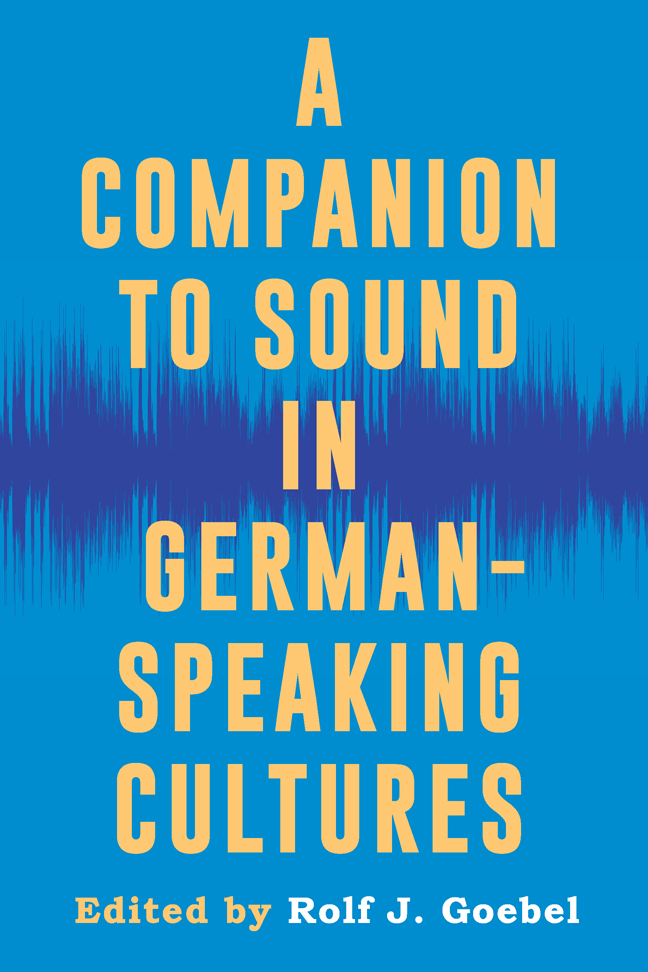Book contents
- Frontmatter
- Contents
- List of Illustrations
- Preface
- Introduction
- Part I Sonic Practices from the Middle Ages to the Nineteenth Century
- Part II Rediscovering the Sounds of Modernism
- Part III Listening to the Unbearable: The Sounds of National Socialism and the Holocaust
- Part IV After the Catastrophe: Sounds in Postwar Germany and Beyond
- Part V Sounds of the Present
- Part VI Epilogue
- Select Bibliography and Further Reading
- Notes on the Contributors
- Index
10 - Jazz and Its Effect on Politics and Modernity as Presented in German Newsreels and Documentaries of the 1960s
Published online by Cambridge University Press: 21 February 2024
- Frontmatter
- Contents
- List of Illustrations
- Preface
- Introduction
- Part I Sonic Practices from the Middle Ages to the Nineteenth Century
- Part II Rediscovering the Sounds of Modernism
- Part III Listening to the Unbearable: The Sounds of National Socialism and the Holocaust
- Part IV After the Catastrophe: Sounds in Postwar Germany and Beyond
- Part V Sounds of the Present
- Part VI Epilogue
- Select Bibliography and Further Reading
- Notes on the Contributors
- Index
Summary
I. Introduction
Although Television Spread Rapidly in West and East Germany in the 1950s and 1960s, the cinema newsreels were still important for many people who could not afford a television set. Cinema newsreel reports and weekly editions (containing eight to fifteen single reports) were exchanged worldwide, and in this way they had the power to shape perspectives on different lifestyles and cultures. Almost every newsreel report was accompanied by music that matched its images and impressed viewers. The music was intentionally chosen and could support a particular meaning. In this regard, West and East German newsreels did not differ. For example, music was used to convey political messages and could express official views on national and international relations or the affiliation to the East-West power blocs. Music played an important role in the struggle for the “Herzen und Köpfe” (hearts and minds) of the people in East and West in their mutual perception through the Iron Curtain. The acceptance or prohibition of popular music such as jazz had an influence on the (young) people's satisfaction with their living conditions in the GDR, including having free choice as regards the music they wanted to listen to. Given the different political and ideological state models of West and East Germany during the Cold War, the use of jazz in the newsreels of the two German states is remarkable. To what extent could viewers in West and East Germany get to know jazz through audiovisual media? I argue that the newsreel films reflect the acceptance of jazz as a musical style by society and politics. Documentary films, in which jazz was presented in a more specific and detailed way, did this as well. In this essay I consider how the aesthetics of newsreels and (television) documentaries affected the popular perception of jazz and jazz musicians in the two German states.
I would like to start with an introductory example: In a report about an amateur jazz band in Hamburg from the West German newsreel Neue Deutsche Wochenschau no. 590 from May 19, 1961, the newsreels speaker says that never before had there been so many young musicians, and he explained that the “intoxication” of jazz became “acute” immediately after the war. Some young people behaved very unusually at musical events, and he comments on the pictures of wildly and enthusiastically gesticulating young people suffering from “Kinderkrankheiten” (teething problems).
- Type
- Chapter
- Information
- A Companion to Sound in German-Speaking Cultures , pp. 165 - 179Publisher: Boydell & BrewerPrint publication year: 2023



